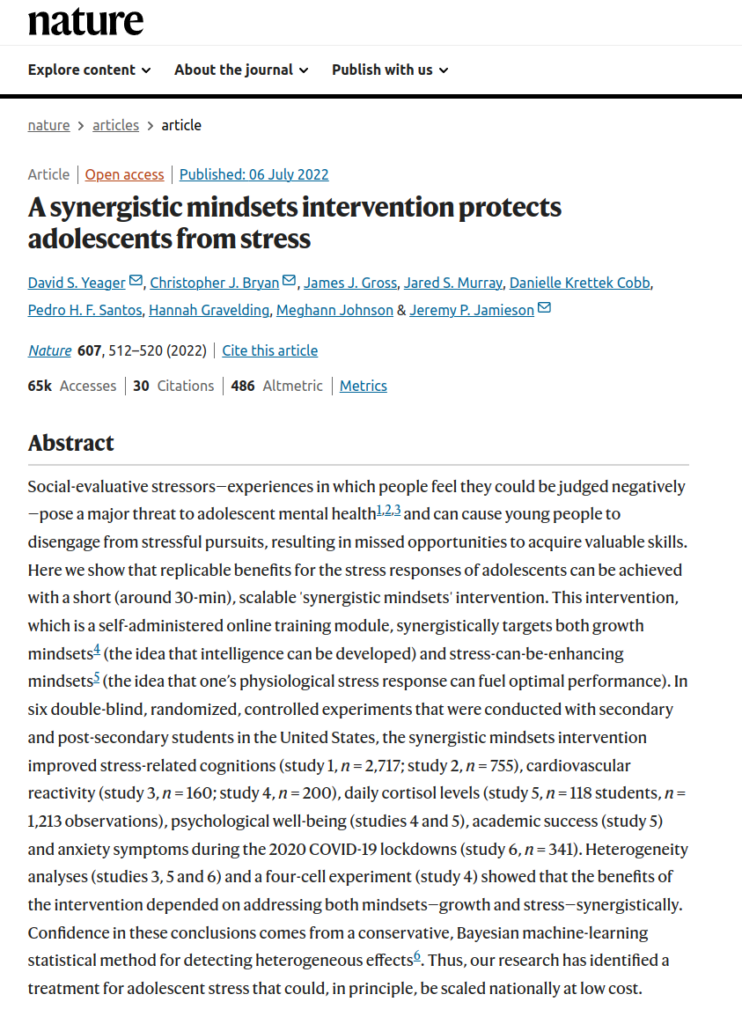Social-evaluative stressors—experiences in which people feel they could be judged negatively—pose a major threat to adolescent mental health1,2,3 and can cause young people to disengage from stressful pursuits, resulting in missed opportunities to acquire valuable skills. Here we show that replicable benefits for the stress responses of adolescents can be achieved with a short (around 30-min), scalable ‘synergistic mindsets’ intervention. This intervention, which is a self-administered online training module, synergistically targets both growth mindsets4 (the idea that intelligence can be developed) and stress-can-be-enhancing mindsets5 (the idea that one’s physiological stress response can fuel optimal performance). In six double-blind, randomized, controlled experiments that were conducted with secondary and post-secondary students in the United States, the synergistic mindsets intervention improved stress-related cognitions (study 1, n = 2,717; study 2, n = 755), cardiovascular reactivity (study 3, n = 160; study 4, n = 200), daily cortisol levels (study 5, n = 118 students, n = 1,213 observations), psychological well-being (studies 4 and 5), academic success (study 5) and anxiety symptoms during the 2020 COVID-19 lockdowns (study 6, n = 341). Heterogeneity analyses (studies 3, 5 and 6) and a four-cell experiment (study 4) showed that the benefits of the intervention depended on addressing both mindsets—growth and stress—synergistically. Confidence in these conclusions comes from a conservative, Bayesian machine-learning statistical method for detecting heterogeneous effects6. Thus, our research has identified a treatment for adolescent stress that could, in principle, be scaled nationally at low cost.
A synergistic mindsets intervention protects adolescents from stress
Abstract
Web and Email Links
Related Listings
Journal
Journal for the Scientific Study of Religion
Clinical observations suggesting a relationship between spiritual experiences, life purpose and satisfaction, and improvements in physical health led to the development of an Index of Core Spiritual Experience (INSPIRIT). Data from 83 medical outpatients showed the INSPIRIT to have a strong degree of internal reliability and concurrent validity. Multiple regression analyses showed the INSPIRIT to be associated with: (1) increased life purpose and satisfaction, a health-promoting attit […]
Journal
Journal of Clinical Medicine
Stress is a term used to define the body’s physiological and psychological reactions to circumstances that require behavioral adjustment [1,2,3], and the relaxation response is a psychophysiological state that is opposite to that of the stress or fight–flight response [4]. A variety of mind/body techniques can be used to elicit a relaxation response and achieve the therapeutic effects associated with reduced blood pressure. For example, researchers at the Cochrane Review [5] investiga […]
Journal
Intelligence
High intelligence is touted as being predictive of positive outcomes including educational success and income level. However, little is known about the difficulties experienced among this population. Specifically, those with a high intellectual capacity (hyper brain) possess overexcitabilities in various domains that may predispose them to certain psychological disorders as well as physiological conditions involving elevated sensory, and altered immune and inflammatory responses (hype […]

